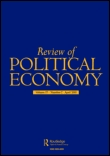
REVIEW OF POLITICAL ECONOMY
Scope & Guideline
Fostering Insightful Analysis of Political and Economic Intersections
Introduction
Aims and Scopes
- Heterodox Economic Theories:
The journal emphasizes alternative economic paradigms, including Post-Keynesian, Neo-Marxian, and Sraffian theories, offering fresh perspectives on traditional economic issues. - Political Economy of Development:
It explores the political and economic factors influencing development processes, particularly in emerging economies and regions affected by historical injustices and structural inequalities. - Monetary Policy Analysis:
The journal regularly examines the implications of various monetary policies on economic stability and distribution, focusing on the intersections of finance and macroeconomic theory. - Distributive Conflicts and Inequality:
Research often investigates the dynamics of income distribution and the conflicts arising from economic disparities, especially in the context of inflation and other macroeconomic challenges. - Environmental and Social Dimensions of Economics:
Recent publications reflect a growing interest in the environmental impacts of economic policies and the social responsibilities of financial institutions, linking economic theory with ecological concerns.
Trending and Emerging
- Digital Economy and Financialization:
There is a notable increase in studies examining the implications of digital platforms and financialization on economic structures, highlighting the need to understand these modern phenomena in the context of political economy. - Intersection of Gender and Economics:
Emerging themes focus on the intersectionality of gender with economic policies and labor markets, showcasing a growing commitment to exploring how gender dynamics influence economic outcomes. - Sustainability and Climate Economics:
Research is increasingly addressing the economic dimensions of sustainability and climate change, reflecting a broader societal push for environmentally responsible economic practices. - Impact of COVID-19 on Economic Policy:
The pandemic has catalyzed new research into the implications of economic policies during crises, particularly regarding inequality, public health, and the role of development banks. - Inequality and Economic Justice:
A rising focus on the mechanisms of inequality and the quest for economic justice is evident, with many papers exploring the relationships between policy, distribution, and social welfare.
Declining or Waning
- Classical Economic Models:
There appears to be a waning interest in classical economic models that do not incorporate contemporary issues such as inequality and environmental sustainability, as newer frameworks are preferred. - Pure Neoclassical Approaches:
Neoclassical economic theories are less frequently explored, indicating a shift towards more critical and interdisciplinary approaches that challenge the assumptions of standard neoclassical models. - Traditional Labor Economics:
Research focusing solely on traditional labor economics without integrating broader social or political contexts has diminished, as the journal increasingly prioritizes interdisciplinary studies.
Similar Journals
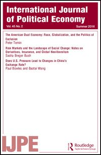
INTERNATIONAL JOURNAL OF POLITICAL ECONOMY
Illuminating the Interplay of Power and EconomicsINTERNATIONAL JOURNAL OF POLITICAL ECONOMY, published by Routledge Journals, Taylor & Francis Ltd, serves as a premier platform for scholarly discourse in the interdisciplinary fields of economics, political science, and sociology. With a focus on the intricate relationship between economic systems and political structures, this esteemed journal facilitates the exploration of contemporary issues from critical perspectives. The journal boasts a commendable impact factor and holds a Q2 ranking in Economics and Econometrics, Political Science and International Relations, and Sociology and Political Science, underscoring its significant contribution to these fields. Researchers and professionals are encouraged to engage with its robust archive spanning from 1996 to 2024, featuring rigorous peer-reviewed articles that enhance understanding of global economic and political dynamics. Although it is not an Open Access journal, it offers various access options to cater to the needs of its diverse readership. The journal's commitment to advancing knowledge and fostering academic collaboration makes it an invaluable resource for anyone interested in political economy.
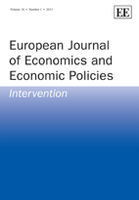
European Journal of Economics and Economic Policies-Intervention
Transforming economic understanding through high-quality scholarship.European Journal of Economics and Economic Policies-Intervention is a leading academic journal published by Edward Elgar Publishing Ltd, focusing on the intersection of economics and policy-making. Established in 2004 and set to continue through 2024, the journal is dedicated to fostering innovative research and providing a platform for interdisciplinary dialogue within the realms of economics and finance. With an H-index that reflects citation impact, it is indexed in Scopus, showcasing a respectable rank in both Economics and Econometrics, as well as Finance, categorizing it in the Q3 quartile. This journal targets a diverse readership, including researchers, professionals, and students, offering valuable insights and findings that shape economic thought and policy across Europe and beyond. While the journal operates under a subscription model, it remains committed to delivering high-quality scholarship that contributes significantly to the fields of economics and economic policies. As it continues to grow in influence, European Journal of Economics and Economic Policies-Intervention stands out as a vital resource for those seeking to understand and impact economic interventions in a rapidly evolving landscape.
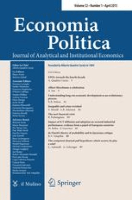
Economia Politica
Catalyzing Scholarly Engagement in Socio-Political ResearchEconomia Politica, published by SPRINGER INT PUBL AG, is a prestigious academic journal based in Switzerland, focusing on the intersection of economics, finance, sociology, and political science. With an impressive 2023 impact factor reflected in its Q2 and Q1 quartile rankings, the journal ranks #295 out of 1466 in Sociology and Political Science and #228 out of 716 in Economics and Econometrics category, highlighting its significance in the field. Spanning over a collaborative history from 2008 to 2024, the journal aims to foster scholarly dialogue and disseminate impactful research that contributes to the understanding of economic and political phenomena. Researchers and professionals interested in comprehensive analyses and innovative studies are encouraged to engage with its rigorous content, which remains a critical resource for advancing knowledge in socio-economic policies and frameworks.
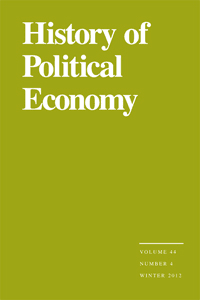
HISTORY OF POLITICAL ECONOMY
Advancing Scholarship at the Convergence of Politics and EconomyHISTORY OF POLITICAL ECONOMY, published by DUKE UNIVERSITY PRESS, stands as a premier journal in the interdisciplinary fields of political economy and history. With an ISSN of 0018-2702 and an E-ISSN of 1527-1919, the journal provides a platform for rigorous scholarship that spans from its converged years beginning in 1986 to the present, aiming to elucidate the complex interplay between economic policies and historical contexts. It holds impressive rankings, peaking in the Q1 category for History and Q2 in Economics and Econometrics as of 2023, showcasing its impact and prestige in the scholarly community. Notably, it is ranked within the 88th percentile in Arts and Humanities History and maintains a significant presence in the 24th percentile for Economics and Econometrics. Although it does not currently offer open access, the journal remains committed to advancing knowledge and fostering thoughtful discourse among researchers, professionals, and students alike. Located in Durham, NC, the journal is dedicated to exploring the rich historical narratives that have shaped economic thought and policy, making it an essential read for those seeking to navigate the intricate landscape of political economy.

POLITICKA EKONOMIE
Bridging Economics and Political Thought for a Better TomorrowPOLITICKA EKONOMIE is a prominent academic journal published by VYSOKA SKOLA EKONOMICKA in the Czech Republic, focusing on the intersection of economics, sociology, and political science. Established to foster critical discourse within these fields, the journal's ISSN is 0032-3233, and it operates with an E-ISSN of 2336-8225. With a convergence history dating back to 1980, POLITICKA EKONOMIE has become a valuable resource for researchers and practitioners seeking insights into societal and economic dynamics. Although the journal is categorized in Quartile 4 for both Economics and Econometrics and Sociology and Political Science categories as of 2023, it continues to contribute significantly to empirical research and theoretical advancements. Researchers will find that while the journal is not open access, it welcomes submissions that engage with contemporary issues and debates, thereby promoting academic exchange and innovation in the social sciences.
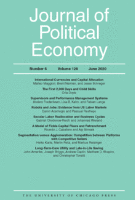
JOURNAL OF POLITICAL ECONOMY
Elevating scholarly dialogue in the realm of political economy.JOURNAL OF POLITICAL ECONOMY, published by University of Chicago Press, stands as a premier outlet for scholarly discourse in the realms of economics and econometrics. With an impressive impact factor and a Q1 category ranking in 2023, this journal ranks #16 out of 716 in its field, placing it amongst the most influential publications, appealing to researchers and professionals alike. Since its inception in 1969, this journal has provided a platform for rigorous analysis and innovative methodologies that shape economic thought. Although currently not open access, the journal's extensive archival resources and contemporary research articles are indispensable for students and academics seeking to engage with foundational and cutting-edge economic theories. With converged years extending up to 2024, it continues to foster critical discussions essential for understanding political economy's complexities, making it a vital resource for anyone dedicated to advancing our knowledge in this pivotal field.
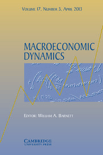
MACROECONOMIC DYNAMICS
Connecting Theory and Empirical Analysis in EconomicsMACROECONOMIC DYNAMICS, a distinguished academic journal published by Cambridge University Press, serves as a pivotal platform for innovative research in the fields of economics and econometrics. With its ISSN 1365-1005 and E-ISSN 1469-8056, the journal has been at the forefront of scholarly communication since its inception in 1997, offering an extensive range of articles that explore dynamic economic models, policy impacts, and theoretical advancements through the latest empirical analyses. Currently holding a Q2 ranking within the 2023 Economics and Econometrics category, and positioned at rank #409 out of 716 within Scopus, it is an essential resource for researchers, professionals, and students alike, looking to stay updated on critical developments in macroeconomic theory and practice. Although it follows a traditional subscription model rather than Open Access, the journal continually strives to disseminate high-quality, peer-reviewed content that informs and inspires the global economics community. The importance of MACROECONOMIC DYNAMICS lies in its commitment to fostering a deeper understanding of economic phenomena, making it a must-read for anyone engaged in the complexities of the economic landscape.

Constitutional Political Economy
Exploring the Nexus of Governance and EconomicsConstitutional Political Economy, published by Springer, is a leading journal in the interdisciplinary field that examines the relationship between constitutional frameworks and economic behavior. With its ISSN 1043-4062 and E-ISSN 1572-9966, the journal has established itself as a significant contributor to discussions in Economics, Law, Philosophy, and Sociology and Political Science, ranking impressively across multiple categories with an impact factor that reflects its scholarly influence: Q3 in Economics and Econometrics, Q2 in Law, Q1 in Philosophy, and Q2 in Sociology and Political Science as of 2023. The journal's scope encompasses theoretical and empirical research that informs the intersections of constitutions and political economy from a variety of perspectives. Published continuously since 1990, it invites contributions from researchers, professionals, and students keen on exploring how constitutional principles shape economic policies and societal outcomes. Although it does not currently offer Open Access options, the insights gleaned from its articles are vital for any academic or practitioner interested in the role of governance in economic systems.
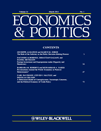
Economics & Politics
Bridging Economic Insights with Political AnalysisEconomics & Politics is a distinguished journal published by Wiley Periodicals, Inc., focusing on the dynamic intersection of economic theory and political analysis. With an ISSN of 0954-1985 and an E-ISSN of 1468-0343, this journal has established itself as a key resource since its inception in 1989, continuing to contribute to scholarly discourse through 2024. The journal is recognized for its rigorous peer-reviewed articles, achieving a commendable Q2 ranking in the field of Economics and Econometrics in 2023. Positioned within the competitive landscape of academic publishing, it ranks 374 out of 716 in Scopus within the subcategory of Economics and Econometrics, reflecting its significant 47th percentile rank. Although it does not feature an Open Access option, the journal remains accessible to researchers, professionals, and students committed to understanding the complex interplay between economic policies and political structures. As a vital platform for innovative research and scholarly debate, Economics & Politics encourages submissions of original articles that challenge conventional wisdom and offer new insights into the economic underpinnings of political strategies.
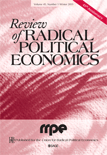
REVIEW OF RADICAL POLITICAL ECONOMICS
Exploring radical perspectives on political economy.REVIEW OF RADICAL POLITICAL ECONOMICS, published by SAGE PUBLICATIONS INC, is a prominent journal dedicated to advancing the discourse on economic theory and political economy. Established in 1969, it has been at the forefront of critical analyses and innovative perspectives, focusing on issues that intersect economics and social philosophy. With an impact factor indicative of its scholarly influence—ranking in the Q2 category in Economics and Econometrics and Q1 in Philosophy—this journal serves as an essential resource for researchers, professionals, and students seeking to explore radical approaches to economic and political systems. Although it is not an open-access publication, the journal offers diverse access options for institutions and individuals committed to deepening their understanding of economic realities. Its reputable standing, bolstered by a strong presence in Scopus rankings—84th percentile in Philosophy and 49th percentile in Economics—demonstrates its contribution to shaping contemporary economic thought and fostering dialogue within the academic community.